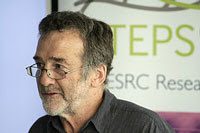Brian Wynne wasn’t the only one who pointed it out, but he was particularly eloquent: he felt that when he analyzed and critiqued Northern institutions, he was, in a way, doing work for international development. He helps open the space and the possibility for researchers, intellectuals and citizens from developing countries to critique their own institutions and assumptions, and challenge the models from the north that work for neither the North nor the South. Photo: Brian Wynne by Lance Bellers
His comments reflect an undercurrent in the Symposium: that the North-South divide that has defined international development are no longer fully applicable. Working in the North can influence the south and vice versa.
While not assuming that poverty – or wealth – is identical in developed or developing countries, increasingly, global challenges and increasingly mobile people and ideas suggest that new models of international development are needed that go beyond these overly simplistic divisions. Increasingly, we see convergence of interests and ideas around the global challenge of climate change.
There were different ideas of what that meant. Some argued for a ‘3 pole’ approach: ‘West’, China/India and the South (Africa and South America – excluding, I assume, Brazil). Others argued for a people-centered perspective, one that suggests as many ‘poles’ or points of reference as there are people. I hope that the ‘new’ vision of international development includes the humility to recognize that all countries, and all people, are developing, with no one ever obtaining a state of ‘full’ development.
Sara is an MA student in Science, Society and Development at the Institute of Development Studies
